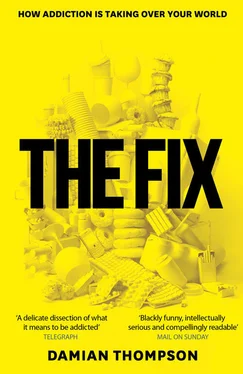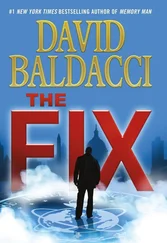A cupcake, a smartphone and a common painkiller. These three objects are so innocent-looking that you could leave them on your desk at work and no one would comment (though the cake might disappear). You can easily consume all three simultaneously: swallow the pill for your bad back with a slurp of coffee while checking your text messages and picking at that yummy frosted topping.
On the other hand, each of these mundane items can get us into trouble. They are objects of desire that can reinforce addictive behaviour – the sort that creeps up on you when your defences are down. That’s the subject of this book: a social environment in which more and more of us are being pulled towards some form of addiction, even though we may be unaware of the fact and never become full-blown addicts.
It’s not obvious to us now, but the most far-reaching social development of the early 21st century is our increasingly insistent habit of rewarding ourselves whenever we feel the need to lift our moods.
When our hand creeps out towards yet another square of organic chocolate, or when we play just one more game of Angry Birds before setting off for work, or when we check a secretly bookmarked porn site for new arrivals, we’re behaving like addicts. The activity in question can be innocent or shameful. Either way, it reinforces the addictive streak in human nature.
That streak is there because our brains have evolved to seek out immediate, short-term rewards. Our ancestors needed to stuff themselves with energy-rich berries and to respond quickly to sexual stimulation; we wouldn’t be here if they hadn’t.
Our problem is that we’ve built an environment that bombards us with rewards that our bodies don’t need and that do nothing to ensure our survival as a species. Yet, because they are rewards – that is, because they provoke specific feelings of anticipation and pleasure in the brain – we grab them anyway.
To put it another way, we reach out for a fix.
That’s a word we associate with helpless addicts. They talk about their ‘fix’ because it feels as if they’ve temporarily fixed themselves when they take their drug of choice. There’s no mystery about this. As a result of heavy exposure to the drug, they have become dependent on frequent chemical rewards. Their brains are in a state of hyper-vigilance, waiting for the blessed relief of a chemical that, once tolerance develops, merely allows the addict to feel normal, as opposed to anxious and ill.
That much is not in dispute. Many addiction specialists go further, however. They say that the brains of addicts are fundamentally different from those of non-addicts. They are forced to chase these rewards because they have ‘the disease of addiction’.
This book challenges that theory. It suggests that, if you keep eating chocolate biscuits until you feel sick, you’re indulging in a milder version of the addictive behaviour that leads heroin addicts to overdose. I’m not equating the two situations, of course. I’m suggesting that they lie at different points on a spectrum of addictive behaviour on which everyone can be located.
Also, and more importantly, many of us are being pulled towards the dangerous end of the spectrum, thanks to technological and social changes that stimulate the most fundamental of all our instincts – desire.
Never before have we had access to so many desirable things and experiences that we hope will change our moods. I know ‘things and experiences’ sounds vague, but that’s really the point. Addiction has never been confined to substance abuse, and with each passing week technology unveils a new object, process or relationship we can obsess over.
For example, these days our fixes are often delivered to us through social networking tools such as Facebook or Twitter that enable us to manipulate our circle of friends. Installing and deleting people as if they were iPhone apps offers a quick and dirty method of changing our feelings (though, needless to say, we are furious when someone deletes us). It’s a consumer experience.
In any discussion of addiction, whether of the trivial or life-threatening variety, the concept of desire is just as important as that of pleasure. Usually, it’s more important. That’s because the anticipation of the fix is more powerful than the moment of consumption, which often fails to live up to expectations. Sometimes we throw internal tantrums when this happens. The fix infantilises us so that, like children, we are constantly and annoyingly hungry for more.
Believe me, I speak from experience.
I spent many years as an addict. I was pathetically addicted to alcohol between the ages of 18 and 32. It took me a long time to acknowledge the fact, though – to realise that the act of getting drunk delighted and obsessed me to a degree that set me apart from most of my friends and colleagues. My doctor tells me I’m still an addict. I’m not exactly happy to wear that label after spending such a long time avoiding so much as a sip of alcohol, but the evidence is compelling. Since giving up drinking, my addictive desires have attached themselves to one thing, person or experience after another. I can’t swallow a Nurofen Plus for a headache without hoping that I’ll enjoy a little codeine buzz. I can obsess for ten minutes in front of a display of confectionery in a newsagent’s. And my CD-buying habit has nearly bankrupted me. Trivial stuff compared with my drinking, but my over-reactions to these stimulations don’t feel normal, exactly.
Perhaps the crucial feature of addiction is the progressive replacement of people by things. That deceptively simple statement is a brilliant insight, though I can’t claim credit for it. It comes from Craig Nakken, author of a bestselling book called The Addictive Personality, who argues that addicts form primary relationships with objects and events, not with people.
He writes: ‘Normally, we manipulate objects for our own pleasure, to make life easier. Addicts slowly transfer this style of relating to objects to their interactions with people, treating them as one-dimensional objects to manipulate as well.’
What begins as an attempt to find emotional fulfilment ends up turning in on itself. Why? Because the addict comes to judge other people simply in terms of how useful they are in delivering a fix. And, at some stage, everybody lets you down. Therefore the addict concludes that objects are more dependable than people. Objects have no wants or needs. ‘In a relationship with an object the addict can always come first,’ says Nakken. 2 Конец ознакомительного фрагмента. Текст предоставлен ООО «ЛитРес». Прочитайте эту книгу целиком, купив полную легальную версию на ЛитРес. Безопасно оплатить книгу можно банковской картой Visa, MasterCard, Maestro, со счета мобильного телефона, с платежного терминала, в салоне МТС или Связной, через PayPal, WebMoney, Яндекс.Деньги, QIWI Кошелек, бонусными картами или другим удобным Вам способом.
I felt a shiver of recognition when I first read those words. But it wasn’t just my own behaviour that came to mind, or that of people whom society can conveniently label ‘addicts’. This may come across as a presumptuous thing to say, but over the last decade I’ve been struck by the way friends and colleagues, most of them psychologically far healthier than me, have begun to display aspects of the process Nakken describes. Lifestyle accessories exert an ever greater power over them, disrupting relationships, nurturing obsessions and – as I’ve noticed in the office – dominating conversation.
Читать дальше












